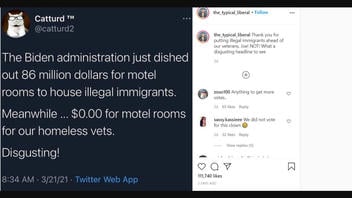
Does the federal government spend $0 on housing homeless veterans? No, that's not true: The 2021 budget for the Department of Veterans Affairs (VA) earmarks approximately $1.9 billion for homeless programs, including housing programs. One such program combines services and vouchers to help homeless veterans and their families find permanent housing. Another gives grants and per diem payments to nonprofits and state, local and tribal governments to develop and operate transitional housing.
The claim appeared in an Instagram post (archived here) published by "the_typical_liberal" on March 21, 2021. The post included the following introductory message: "Thank you for putting illegal immigrants ahead of our veterans, Joe! NOT! What a disgusting headline to see." The main part of the post was a screenshot of a tweet (archived here) published by "Catturd ™," a well-known, right-wing provocateur. The post and tweet read:
The Biden administration just dished out 86 million dollars for motel rooms to house illegal immigrants. Meanwhile ... $0.00 for motel rooms for our homeless vets. Disgusting!
This is what users saw on social media:
This fact-check does not address all of the post's claims. It's limited to considering the claim about homeless veterans. The post implies that the federal government spends nothing on housing homeless veterans.
The VA's 2021 budget is approximately $243 billion. Of that, an estimated $1.9 billion is earmarked for homeless programs, including housing programs. One such program is the U.S. Department of Housing and Urban Development-VA Supportive Housing (HUD-VASH) program, which is a mix of housing vouchers and supportive services. The VA offers the following explanation of the program on its site:
Through public housing authorities, HUD provides rental assistance vouchers for privately owned housing to Veterans who are eligible for VA health care services and are experiencing homelessness. VA case managers may connect these Veterans with support services such as health care, mental health treatment and substance use counseling to help them in their recovery process and with their ability to maintain housing in the community. Among VA homeless continuum of care programs, HUD-VASH enrolls the largest number and largest percentage of Veterans who have experienced long-term or repeated homelessness. At the end of FY 2019, there were 90,749 Veterans with active HUD-VASH vouchers and 83,684 vouchers in use.
According to the VA, since 2010, more than 800,000 veterans and their family members have been permanently housed, rehoused or prevented from falling into homelessness as a result of VA homelessness programs and HUD's housing vouchers.
Among other VA programs for homeless veterans are the Homeless Providers Grant and Per Diem (GPD) program and what's known as Supportive Services for Veteran Families (SSVF). The former gives grants and per diem payments to nonprofits and state, local and tribal governments to develop and operate transitional housing and service centers. The latter provides services to prevent the loss of veterans' homes or to rehouse veterans experiencing homelessness.
In addition to the $1.9 billion earmarked for homeless programs, a VA spokesperson told Lead Stories that the GPD and SSVF programs received more than $800 million in funding from the CARES Act, a $2.2 trillion stimulus package passed in March 2020. In an email to Lead Stories, dated March 26, 2021, the spokesperson wrote:
In response to the COVID-19 pandemic, SSVF significantly expanded use of emergency housing placements in hotels and motels to reduce the risk of disease transmission. Between April 2020 and February 2021, SSVF placed 25,347 Veterans in hotels and motels.
Contrary to what the post claims, then, hotel and motel rooms are absolutely part of the VA's programs for homeless veterans.

















